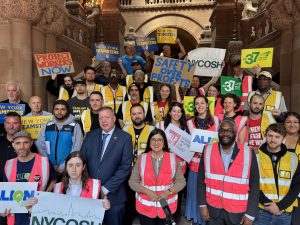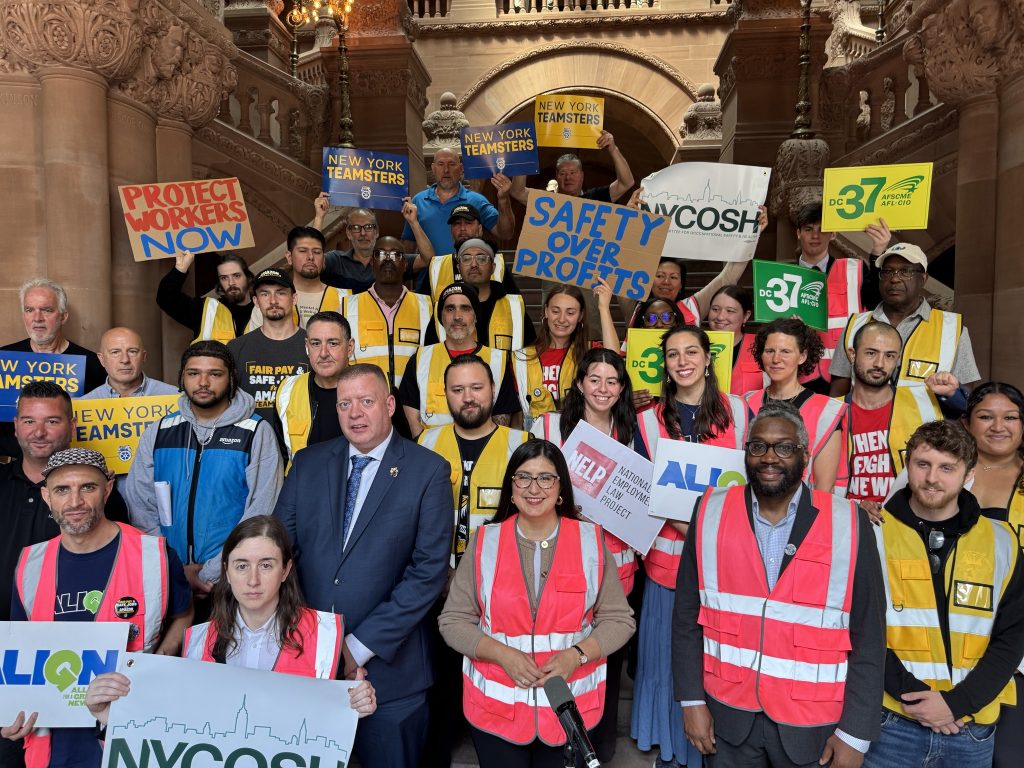
Gig Workers and Minimum Wage Loom Large in NYC Election
By MOHAMED FARGHALY
mfarghaly@queensledger.com
As New York City’s mayoral race intensifies, one of the central questions is how the next mayor will address the needs of the city’s working population, including the hundreds of thousands of gig workers who keep the city running. With affordability challenges mounting, voters are scrutinizing candidates’ plans on wages, worker protections, and benefits.
Paul Sonn, director of NELP Action, a nonprofit research and policy organization focused on labor and employment issues, said the stakes are high for working families in the city. “I’m trained as a lawyer, but I for a long time, have worked on Labor and Employment Policy for with the National Employment Law Project Action Fund, we’re a nonprofit research and policy organization, and so we work with state and local government and worker advocates on policies like the minimum wage and protections for gig workers and health and safety protection and unemployment insurance, and kind of immigration related policy and policy as it applies to the workplace.”
Sonn emphasized that key worker policy issues, including proposals to raise the minimum wage, stronger protections for gig workers, and paid leave, have become central in the race. “New York has already been a leader in many ways, in protecting workers in recent years, but there’s a lot more that it can do, and especially as part of an agenda to make the city more affordable for working families. The next mayor can do a lot to ensure that jobs provide decent pay and protections for New Yorkers at every income level.”
Raising the minimum wage is a top priority for the next mayor, as New York’s current rate of $16.50 lags far behind other major cities. Sonn noted that in Seattle, the minimum wage is nearly $21 an hour, while in Denver it is around $19. Advocates argue that a higher wage is critical to helping working families keep up with the city’s high cost of living.
Paid leave protections are another area where New York falls short. While the city has a limited law guaranteeing paid sick days, other cities provide broader access for family emergencies, doctor visits, and parent-teacher conferences. Sonn emphasized that expanding paid leave would make life more affordable and manageable for families struggling to balance work and personal responsibilities.
Gig workers, including food delivery and ride-share drivers, face ongoing challenges despite some of the nation’s strongest protections in the city. Sonn said a persistent problem is unfair firings, where workers are often removed from apps without warning or due process, leaving many unable to earn income or pay for essential expenses. Strengthening protections against these practices is emerging as a key campaign issue.
Other labor proposals under consideration include requiring companies like Amazon to directly employ delivery workers rather than subcontracting them. This change would aim to guarantee better wages and benefits while providing oversight to ensure safer working conditions. According to Sonn, such measures would be among the first of their kind in the country.
The debate over wages is tightly linked to broader affordability challenges, including housing, food, and childcare. Sonn said a higher minimum wage is “the foundation for being able to afford life in this super expensive city,” and that New York’s current rate exacerbates the cost pressures faced by working families.
Some critics warn that raising wages could push businesses out of the city. Sonn pointed to research from other U.S. cities, noting that predicted job losses largely have not materialized. “Most of the jobs that are most significantly affected are service jobs that really are linked to their locations… Those jobs aren’t going anywhere,” he said, stressing that fair pay can be implemented without harming local employment.
Sonn also highlighted that strong worker protections can coexist with economic growth. Cities like Seattle and Denver have higher minimum wages and comprehensive labor safeguards while maintaining thriving local economies. He said New York has made progress protecting gig and fast-food workers, but a citywide minimum wage that aligns with the cost of living remains a conspicuous gap.
On what question he would pose to candidates, Sonn said, “I guess, what are you going to do to ensure that every job pays a living wage and provides the protections that working New Yorkers need to thrive and afford life in our expensive city.”
NELP Action does not endorse candidates, instead focusing on policy analysis. Sonn said, “We just comment on policy. And so we were kind of all commenting on the platforms that are policy and positions that different candidates have articulated. We’re a nonpartisan organization.”
As the campaign moves forward, worker protections, wages, and affordability are expected to remain central topics in debates and policy proposals, shaping the future of the city for millions of New Yorkers.



